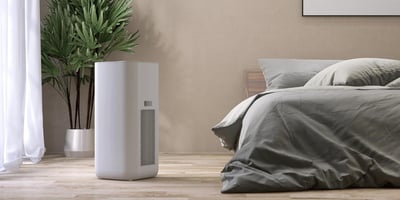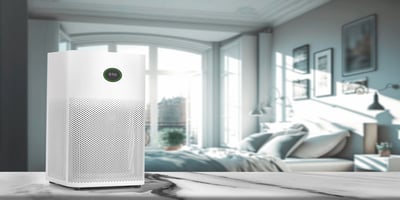Can an Air Purifier Eliminate Smoke Smells?
Key Takeaways
- True HEPA filters grab 99.97% of smoke particles down to 0.3 microns.
- No activated carbon? You're catching particles but the smell stays.
- That 300 sq ft rating on the box? Probably optimistic. Size up.
- Heavy smoke cuts filter life in half, so check yours monthly.
- Purifiers work faster when you control the source too.
Your cousin smoked on the patio six months ago. The living room still smells like an ashtray. You've tried candles, sprays, even leaving windows open for days. Nothing works. So do air purifiers help with smell from smoke? They can, but only with the right filtration technology. Grab one without activated carbon and you'll waste money on a machine that just pushes smoky air in circles.
Why Smoke Odors Stick Around So Long
Here's the thing about smoke. It doesn't just float in the air and disappear. Cigarette smoke contains over 7,000 chemicals. Wildfire smoke carries ash, carbon particles, and dozens of volatile organic compounds. Both types leave behind particles so tiny they burrow into upholstery, carpet fibers, even your drywall.
And those particles? Minuscule. We're talking 0.1 to 1 micron in size. A human hair measures about 70 microns across, so smoke particles are invisible to the naked eye. They drift through your rooms, settle into fabrics, get sucked into your HVAC ductwork. Standard cleaning won't touch them.
A single cigarette smoked indoors deposits particles that continue off-gassing for three to six months. That guest who lit up "just once" in December? You might still catch whiffs in May.
Three culprits make smoke so stubborn. Particulate matter creates that visible haze and carries odor-causing substances deep into your home. Volatile organic compounds produce the sharp, irritating smell you associate with smoke. Tar and resin residue coats your surfaces and keeps releasing odors for months through off-gassing.
An air purifier for cigarette smoke needs to tackle all three. Miss even one category, and you'll still notice that smell every time you walk through the door.
How Air Purifiers Actually Remove Smoke
 Not every air purifier handles smoke well. Plenty fail miserably. Knowing how air purifiers work explains why some succeed and others merely recirculate smoky air around your room.
Not every air purifier handles smoke well. Plenty fail miserably. Knowing how air purifiers work explains why some succeed and others merely recirculate smoky air around your room.
The basic idea sounds simple enough. Pull room air through filters, trap the bad stuff, circulate clean air back out. But smoke throws a wrench into this because it demands specific filter types most budget purifiers don't include.
Mechanical Filtration vs. Gas-Phase Filtration
True HEPA filters capture 99.97% of particles at 0.3 microns or larger. That covers most smoke particles, though the smallest ones can sneak through. Look for H13 or H14 HEPA classifications if you want the best performance. Ever seen MERV ratings on filters? That scale runs from 1 to 20, and for smoke you want MERV 13 or higher. Anything lower lets too many fine particles slip past.
Here's where most air purifiers drop the ball. HEPA filters excel at particles but do absolutely nothing for gases. Those VOCs causing the actual smell? They sail right through mechanical filtration like it isn't even there.
|
Filter Type |
Captures |
Misses |
|
HEPA |
Smoke particles, ash, dust, allergens |
Gases, VOCs, odors |
|
Activated Carbon |
VOCs, odors, chemical fumes |
Particles, dust, allergens |
Activated carbon works completely differently. The porous surface attracts and traps gas molecules through adsorption. More carbon means more capacity for absorbing odors. Those budget purifiers with paper-thin carbon pre-filters? Not enough for heavy smoke. You need a substantial carbon bed to make a real dent.
Multi-Stage Systems
The most effective air purifier for smoke layers both technologies. A pre-filter catches larger particles and protects your main filters from clogging too fast. Behind that sits a true HEPA filter removing fine smoke particles. The final stage uses activated carbon to absorb gaseous odors and VOCs.
Some units tack on UV-C light or ionization. Marginal benefits for smoke, honestly. Don't let those extras distract you from solid filtration.
Benefits of Running an Air Purifier for Smoke
Running a quality air purifier for smoke does more than make your place smell better. Research into air purifier benefits shows real advantages for health, comfort, and home maintenance.
Your lungs notice first. Smoke particles penetrate deep into lung tissue, and PM2.5 particles pose the biggest risk because they bypass your body's natural defenses completely. If you've got asthma or allergies, continuous filtration reduces your exposure significantly. During wildfire season, smoke seeps through gaps around doors and windows even with everything closed. A properly sized air purifier for smoke creates a cleaner breathing zone when you can't escape the haze outdoors.
The smell fades faster too. Without intervention, lingering smoke odor sticks around for weeks. Sometimes months. Particles slowly release from surfaces in an endless cycle of recontamination. Active purification breaks that cycle by capturing airborne particles and gases before they settle back onto your stuff.
Your belongings benefit as well. Ever notice the yellowing on walls and ceilings in a smoker's home? That's tar buildup. Smoke residue coats everything from windows to electronics to artwork. Purifiers grab particles before they land, cutting down on accumulation and saving you hours of scrubbing later.
Even sleep improves. Studies link elevated particulate matter to increased sleep disturbances. A bedroom purifier gives you a fresher environment that often translates into more restful nights.
Finding the Right Air Purifier for Smoke
Different designs suit different situations. What works for a studio apartment won't cut it for a 2,000 square foot house with smoke damage in every room.
Choosing Filter Technology
The HEPA plus activated carbon combination remains the gold standard. Dual filtration attacks both particles and gases at once. When shopping, prioritize true HEPA certification rather than vague "HEPA-type" labels. Make sure the carbon component is substantial. And double-check room coverage since manufacturers love to exaggerate.
The Sensibo Pure fits this profile well. Beyond the 99.97% HEPA filtration down to 0.1 microns, what stands out is the smart scheduling. Set it to run harder during cooking or when outdoor AQI spikes, then dial back overnight to save energy. The app tracks filter status too, so you're not guessing when replacement is due. It handles smoke, VOCs, dust, mold spores, and airborne bacteria.
Sizing for Your Space
Bigger rooms need more airflow. Simple as that. The Clean Air Delivery Rate tells you how many cubic feet a purifier cleans per minute. For smoke, check the smoke CADR specifically.
|
Room Size |
Minimum Smoke CADR |
|
150 sq ft |
100 |
|
300 sq ft |
200 |
|
500 sq ft |
350+ |
Undersizing means your purifier can't keep pace with contamination. Better to go bigger than smaller.
Portable vs. Whole-Home Systems
Portable units offer flexibility. Move them wherever smoke concentrates worst. They're cheaper upfront and you won't need a professional installer. Whole-home systems tie into your HVAC and clean air everywhere simultaneously. More expensive, yes. But convenient if smoke infiltration affects your entire house.
Portable purifiers work best when you need to:
- Target specific rooms like bedrooms or home offices
- Move filtration between spaces as needed
- Start small without major investment
- Rent or can't modify HVAC systems
Whole-home systems make sense when:
- Smoke affects every room
- You want set-it-and-forget-it convenience
- Budget allows for professional installation
- You're already upgrading HVAC equipment
For air purifier for cigarette smoke situations limited to one or two rooms, grab a portable like the Sensibo Pure. Whole-house problems? Supplement your HVAC filtration with strategically placed portables in the worst spots.
Other Ways to Fight Smoke Smell
 An air purifier for smoke smell works best alongside other tactics. Start with prevention, then layer in cleaning and smart ventilation.
An air purifier for smoke smell works best alongside other tactics. Start with prevention, then layer in cleaning and smart ventilation.
Prevention comes first. During wildfires, seal windows and doors, run your HVAC on recirculate, skip the candles and gas stove. For tobacco smoke, designate outdoor smoking spots away from any windows. "Smoking by the window" still lets plenty of smoke drift inside.
But if smoke's already embedded in your home, deep cleaning makes a real difference. Those particles trapped in furniture and carpets keep releasing odors until you physically remove them.
- Wash all fabrics including curtains, bedding, and slipcovers
- Steam clean carpets and upholstery since heat loosens trapped particles
- Scrub hard surfaces with TSP solution for heavy tar residue
- Replace your HVAC filters, which trap smoke particles in ductwork
Once surfaces are clean, ventilation timing matters. Opening windows helps, but check air quality indexes first. During wildfire season, outdoor air might actually be worse than what's inside. Wait for AQI below 50 before throwing windows open. Cross-ventilate by opening windows on opposite sides of your home to push contaminated air out rather than diluting it in place.
For surface-level odors your purifier can't reach, add some odor absorbers. Baking soda, activated charcoal sachets, commercial products. Place them near contaminated surfaces. Severe smoke damage sometimes requires professional help like ozone treatment or thermal fogging. These methods address contamination buried too deep for consumer solutions. Your air purifier then maintains that improved air quality going forward.
Final Thoughts
The real power of an air purifier for smoke smell goes beyond clearing what's already there. It prevents that odor from becoming permanent in the first place. Run one consistently, and you won't find yourself fighting months of accumulated contamination later.
FAQ
How long before an air purifier removes smoke smell?
Light contamination often improves within hours. Heavy smoke might need continuous operation for several days. The tricky part is surface contamination that keeps releasing particles over time.
Can air purifiers remove thirdhand smoke?
Partially. Thirdhand smoke describes residue on surfaces that keeps off-gassing long after the cigarette's gone. Purifiers capture those released gases and particles, but they can't pull contamination out of your fabrics and walls. You'll need deep cleaning for that. The purifier handles what gets released afterward, acting as continuous maintenance rather than a one-time fix. Pair both approaches and the smell disappears faster than either method alone.
Do ionizers work for smoke?
They charge particles and make them stick to surfaces instead of floating in the air. So the smoke coats your walls and furniture rather than your lungs. Some ionizers produce ozone too, which irritates respiratory systems. Stick with HEPA plus carbon.
How often should I replace filters with heavy smoke?
More often than you'd expect. Heavy smoke can cut filter life in half. Check monthly and replace when you see discoloration or notice reduced airflow. Smart purifiers like the Sensibo Pure track filter status and remind you automatically.
Will any air purifier eliminate smoke completely?
No purifier hits 100% removal, and none can extract contamination already embedded in your surfaces. They work best at reducing ongoing exposure and preventing new accumulation. Pair purification with cleaning for the most complete results.



































.jpg?height=200&name=photo_2024-08-30_10-29-45%20(1).jpg)


